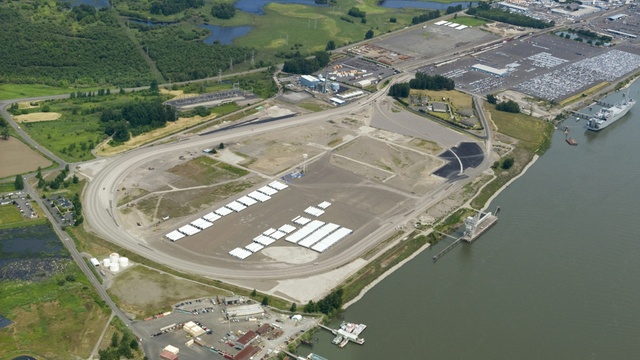The Columbian
The Port of Vancouver on Wednesday released an updated version of its lease for the Northwest’s largest oil-by-rail transfer terminal, featuring fewer censored details but maintaining redactions of key issues the port considers sensitive.
The port released the updated version of its lease (429 pages in electronic format) with Tesoro Corp. and Savage Companies in response to multiple requests made in April by various parties, including the Columbian and The Oregonian newspapers, Theresa Wagner, the port’s communications manager, said Wednesday.
In the original version of the lease, the port had kept secret a total of 22 pieces of information. In the updated rendition, the port revealed 11 of those 22 pieces of information, Wagner said.
One revelation: The port is allowed to terminate the lease if Tesoro and Savage fail to launch construction within four months after both parties are presumed to have fulfilled certain other contractual obligations.
Previously, the port had censored the companies’ construction timeline.
Still kept a secret, however, are the number of months — since the effective date of the lease — the port and companies have to cancel the lease early if either party fails to meet their contractual obligations.
Exactly how those obligations, known as “conditions precedent,” work isn’t entirely clear. An obvious allowed reason for cancelling the deal is if Tesoro and Savage fail to obtain permits from state regulators.
The companies submitted their permit application to the state Energy Facility Site Evaluation Council on Aug. 29, seeking to handle as much as 380,000 barrels of oil per day for eventual conversion into transportation fuel. Washington Gov. Jay Inslee has the final say over the project.
Another disclosure the port made Wednesday: If Tesoro and Savage move a certain average volume of oil per day for 30 months after they start making rent payments to the port, then the companies get to keep exclusive rights to run an oil terminal at the port.
The port, under that scenario, wouldn’t be able to lease property to a new tenant who also wants to handle crude oil.
Previously, the port had censored how long the companies would have to maintain certain oil volumes to keep their exclusivity rights.
However, the oil volumes — and the date on which the companies start paying rent to the port — are still unknown, because the port kept them redacted in the updated version of its lease.
The port also maintained redactions of the amounts of wharf and dockage fees it will charge Tesoro and Savage. Those unknown fees are in addition to lease revenue that’s already known: The agreement involves 42 acres and is worth at least $45 million to the port over an initial 10 years.
The port is maintaining certain redactions under the Uniform Trade Secrets Act, saying that if certain pieces of information were made public, it would harm the port in various ways, including damaging its competitiveness and its ability to negotiate
Wagner said the port chose to reveal certain pieces of information because they’ve either become known from the Tesoro-Savage permit application or by way of public presentations given by the companies.
However, a Vancouver city attorney has questioned the port’s redactions. In a Feb. 18 email to the port, two weeks after he’d received and reviewed the lease, Bronson Potter, chief assistant city attorney, wrote that it’s “doubtful that any of the information redacted would qualify as being a ‘trade secret.’?”
The port’s lease also gives Tesoro and Savage first rights on leasing additional property to expand if the average amount of oil moved by the first facility exceeds certain barrels-per-day targets. Those targets remain unknown, because the port kept them secret in the updated version of its lease.
Tesoro and Savage would have to seek another round of permits to expand or build another facility.

